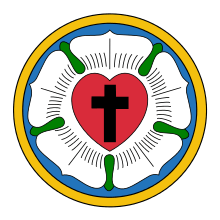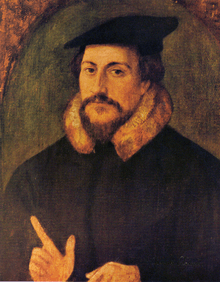Five solae
| Five solae of the Protestant Reformation |
|---|
| Sola scriptura |
| Sola fide |
| Sola gratia |
| Solus Christus |
| Soli Deo gloria |
| Protestantism |
|---|
 |
| The Reformation |
| Great Awakenings |
| History |
| Culture |
| Demographics |
|
|
| Major branches: |
|
|
|
Transdenominational movements: |
| Related movements: |
The five solae (from Latin, sola, lit. "alone"; occasionally Anglicized to five solas) of the Protestant Reformation are a foundational set of Biblical principles held by theologians and churchmen to be central to the doctrine of salvation as taught by Western Protestantism.[1][2][3][4] Each sola represents a key belief in Protestant Christian faith in contradistinction to the teaching of the Roman Catholic Church. The Reformers claimed that the Catholic Church, especially its head, the Pope, had usurped divine attributes or qualities for the Church and its hierarchy.
History
The solas were not systematically articulated together until the 20th century. But sola gratia and sola fide were used in conjunction by the Reformers themselves. For example, in 1554 Melanchthon wrote, "sola gratia justificamus et sola fide justificamur"[5] ("only by grace do we justify and only by faith are we justified"). All of the solas show up in various writings by the Protestant Reformers, but they are not catalogued together by any.[6]
In 1916, Lutheran scholar Theodore Engelder published an article titled "The Three Principles of the Reformation: Sola Scriptura, Sola Gratia, Sola Fides" ("only scripture, only grace, only faith").[1] In 1934, theologian Emil Brunner substituted Soli Deo gloriam for Sola Scriptura.[7] In 1958, historian Geoffrey Elton, summarizing the work of John Calvin, wrote that Calvin had "joined together" the "great watchwords". Elton listed sola fide with sola gratia as one term, followed by sola scriptura and soli Deo gloria.[8] Later, in commenting on Karl Barth's theological system, Brunner added Christus solus to the litany of solas[9] while leaving out sola scriptura. The first time the additional two solas are mentioned is in Johann Baptiste Metz's 1965, The Church and the World.[10]
The Three Solas
In most of the earliest articulations of the solas, three were typically specified: scripture over tradition, faith over works, and grace over merit, each intended to represent an important distinction compared with Catholic doctrine.[1]
Sola scriptura ("by Scripture alone")
Sola Scriptura, or "scripture alone" (literally: "by scripture alone"), asserts that scripture must govern over church traditions and interpretations which are themselves held to be subject to scripture. All church traditions, creeds, and teachings must be in unity with the teachings of scripture as the divinely inspired Word of God.
Sola Scriptura asserts that the Bible can and is to be interpreted through itself, with one area of Scripture being useful for interpreting others. That scripture can interpret itself is a means by which to show the unity of Scripture as a whole. As all doctrines are formed via scriptural understandings, all doctrines must be found to align with Scripture and as such are then subject to scripture before the believer can begin to apply them.
This particular sola is sometimes called the formal principle of the Reformation, since it is the source and norm of the material cause or principle, the gospel of Jesus Christ that is received sola fide ("through faith alone") sola gratia (by God's favor or "grace alone"). The adjective (sola) and the noun (scriptura) are in the ablative case rather than in the nominative case to indicate that the Bible does not stand alone apart from God, but rather that it is the instrument of God by which he reveals himself for salvation through faith in Christ (solus Christus or solo Christo).
Sola fide ("by faith alone")
| Part of a series on |
| Lutheranism |
|---|
 |
|
Bible translators
|
|
Theologians |
|
|
| Part of a series on |
| Calvinism |
|---|
 |
|
Documents |
|
Peoples |
|
|
Sola fide, or "faith alone", asserts that good works are not a means or requisite for salvation. Sola fide is the teaching that justification (interpreted in Protestant theology as "being declared just by God") is received by faith alone, without any need for good works on the part of the individual. In classical Protestant theology, good works are seen to be evidence of saving faith, but the good works themselves do not determine salvation. Some Protestants see this doctrine as being summarized with the formula "Faith yields justification and good works" and as contrasted with the Roman Catholic formula "Faith and good works yield justification." The Catholic side of the argument is based on James 2:14-17. "What does it profit, my brethren, if someone says he has faith but does not have works? Can faith save him? If a brother or sister is naked and destitute of daily food, and one of you says to them, 'Depart in peace, be warmed and filled', but you do not give them the things which are needed for the body, what does it profit? Thus also faith by itself, if it does not have works, is dead." (James 2:14-17, NKJV)
In understanding Sola fide, it is important to understand the nuances of difference between Catholic and Protestant notions of the term "justification". Both groups agree that the term invokes a communication of Christ's merits to sinners, not a declaration of sinlessness; Luther used the expression simul justus et peccator ("at the same time justified and a sinner"). However, Roman Catholicism sees justification as a communication of God's life to a human being, cleansing him of sin and transforming him truly into a son of God, so that it is not merely a declaration, but rather the soul is made actually objectively righteous. The Protestant view of justification, by contrast, is that it is the work of God through the means of grace. Faith is the righteousness of God that is accomplished in us through word and sacraments. Law and gospel work to kill the sinful self and to accomplish the new creation within us. This new creation within us is the faith of Christ. If we do not have this faith, then we are ungodly. Indulgences or human prayers add nothing—they are nothing. Everyone has some kind of faith — usually a faith in themselves. But we need God to continually destroy self-righteous faith and to replace it with the life of Christ. We need the faith that comes from God through law and gospel, word, works and sacraments. In the founding document of the Reformation, the 95 Theses, Luther said that (1) "When our Lord and Master Jesus Christ said, 'Repent' (Matthew 4:17) He willed the entire life of believers to be one of repentance" and (95) "And thus be confident of entering into heaven through many tribulations rather than through the false security of peace (Acts 14:22)".
The true distinction, therefore, between the Protestant and the Catholic view of Justification is not an issue of being "declared righteous" versus being "made righteous", but rather it is the means by which one is justified. In Catholic theology righteous works are considered meritorious toward salvation in addition to faith, whereas in Protestant theology, righteous works are seen as the result and evidence of a truly justified and regenerate believer who has received these by faith alone. The actual effectual means by which a person receives justification is also a fundamental division between Catholic and Protestant belief. In Catholic theology, the means by which justification is applied to the soul is the sacrament of baptism. In baptism, even of infants, the grace of justification and sanctification is "infused" into the soul, making the recipient justified even before he has exercised his own faith (or indeed in the case of an infant who is baptized, before he even has the ability to consciously understand the Gospel and respond with faith). For the Catholic, baptism functions "ex opere operato" or "by the working of the act", and thus is the efficient and sufficient act to bring about justification. In Protestant theology, however, the faith of the individual is absolutely necessary and is itself the efficient and sufficient response of the individual that effects justification.
The Sola fide doctrine is sometimes called the material cause or principle of the Reformation because it was the central doctrinal issue for Martin Luther and the other reformers. Luther called it the "doctrine by which the church stands or falls" (Latin, articulus stantis et cadentis ecclesiae).
Sola gratia
Sola gratia, or "only grace", specifically excludes the merit done by a person as part of achieving salvation. Sola gratia is the teaching that salvation comes by divine grace or "unmerited favor" only, not as something merited by the sinner. This means that salvation is an unearned gift from God for Jesus' sake. While some maintain that this doctrine is the opposite of "works' righteousness" and conflicts with some of the aspects of the Roman Catholic doctrine of merit, it might be asserted that this article, taken at face value, conflicts in no way with Roman Catholic teaching; while the doctrine that grace is truly and always a gift of God is held in agreement between both views, the difference in doctrine lies mainly in two facts: that of God as sole actor in grace (in other words, that grace is always efficacious without any cooperation by man), and second, that man cannot by any action of his own, acting under the influence of grace, cooperate with grace to "merit" greater graces for himself (the latter would be the doctrine of the Roman Catholic Church). This doctrine asserts divine monergism in salvation: God acts alone to save the sinner. The responsibility for salvation does not rest on the sinner to any degree as in "synergism".
Protestant Arminians may also claim the doctrine of sola gratia (but understand it differently) and generally deny the term "synergism" is appropriate to describe their beliefs. Arminians believe that God saves only by grace and not at all by merit, but man, enabled by what is referred to as "prevenient grace", is enabled by the Holy Spirit to understand the Gospel and respond in faith. Arminians believe that this is compatible with salvation by grace alone, since all the actual saving is done by grace. Arminians believe that humans are only capable of receiving salvation when first enabled to do so by prevenient grace, which they believe is distributed to everyone. Arminians therefore do not reject the conception of sola gratia expounded by the Reformation theologians.[11]
John Owens, in A Display of Arminianism, rejects the implied belief that the understanding of the Reformed theology has any alliance between the two doctrines and Arminianism is but another form of pelagianism, known as semipelagianism.
The Five Solas
By the middle of the 20th Century, it became common to see the original list of three increased to create five solas. The additions were "Christ alone" and "Glory to God alone".
Solus Christus or Solo Christo ("Christ alone" or "through Christ alone")
Solus Christus, or "only Christ", excludes the priestly class as necessary for sacraments. Solus Christus is the teaching that Christ is the only mediator between God and man, and that there is salvation through no other (hence, the phrase is sometimes rendered in the ablative case, solo Christo, meaning that salvation is "by Christ alone"). While rejecting all other mediators between God and man, classical Lutheranism continues to honor the memory of the Virgin Mary and other exemplary saints. This principle rejects sacerdotalism, the belief that there are no sacraments in the church without the services of priests ordained by apostolic succession. The Catholic Church teaches that lay people, and even unbaptized people, can validly baptize, and may do so in an emergency, and that the ministers of the sacrament of matrimony are the people getting married, not the priest, who is only a witness to the marriage, although a witness is legally required in the modern Western Catholic church. Other sacraments, according to Catholic doctrine, essentially require a bishop or at least a priest in order to be valid. Martin Luther taught the "general priesthood of the baptized", which was modified in later Lutheranism and classical Protestant theology into "the priesthood of all believers" denying the exclusive use of the title "priest" (Latin sacerdos) to the clergy. This principle does not deny the office of the holy ministry to which is committed the public proclamation of the Gospel and the administration of the sacraments. In this way, Luther in his Small Catechism could speak of the role of "a confessor" to confer sacramental absolution on a penitent. The section in this catechism known as "The Office of the Keys" (not written by Luther but added with his approval) identifies the "called ministers of Christ" as being the ones who exercise the binding and loosing of absolution and excommunication through Law and Gospel ministry. This is laid out in the Lutheran formula of holy absolution: the "called and ordained servant of the Word" forgives penitents' sins (speaks Christ's words of forgiveness: "I forgive you all your sins") without any addition of penances or satisfactions and not as an interceding or mediating "priest", but "by virtue of [his] office as a called and ordained servant of the Word" and "in the stead and by the command of [his] Lord Jesus Christ". [12] In this tradition absolution reconciles the penitent with God directly through faith in Christ's forgiveness rather than with the priest and the church as mediating entities between the penitent and God.
Soli Deo gloria ("glory to God alone")
Soli Deo gloria, or "glory to God alone", stands in opposition to the veneration or "cult" perceived by many to be present in the Roman Catholic Church of Mary the mother of Jesus, the saints, or angels. Soli Deo gloria is the teaching that all glory is to be due to God alone, since salvation is accomplished solely through His will and action — not only the gift of the all-sufficient atonement of Jesus on the cross but also the gift of faith in that atonement, created in the heart of the believer by the Holy Spirit. The reformers believed that human beings —even saints canonized by the Roman Catholic Church, the popes, and the ecclesiastical hierarchy— are not worthy of the glory that was accorded them; that is, one should not exalt such humans for their good works, but rather praise and give glory to God who is the author and sanctifier of these people and their good works. It is not clear the extent to which such inappropriate veneration is actually approved by the Roman Catholic Church and so the extent to which this Sola is one of justified opposition is unclear. The Roman Catholic's official position, for example as described in the documents of the Second Vatican Council, make it clear that God alone is deserving of glory.
Additional Solas
More recently, certain Anglican scholars have suggested that there should be a further two additional solas on the list, bringing the total to seven: Sola ecclesia ("the Church alone") and Sola caritas ("Charitable-love alone").[13][14][15]
See also
References
- 1 2 3 "Four Hundred Years: Commemorative Essays on the Reformation of Dr. Martin Luther and Its Blessed". Archive.org. Retrieved 2015-08-13.
- ↑ Archived October 29, 2014, at the Wayback Machine.
- ↑ "Great Minds of the Western Intellectual Tradition, 3rd Edition Prof. Kors-Philosophy & Intellectual History". Thegreatcourses.com. Retrieved 2015-08-13.
- ↑ "The "Solas" of the Reformation" (PDF). Lmsusa.org. Retrieved 2015-08-13.
- ↑ "Philippi Melanthonis Opera quae supersunt omnia - Philipp Melanchthon". Books.google.com. Retrieved 2015-08-13.
- ↑ Archived May 31, 2013, at the Wayback Machine.
- ↑ "The Mediator: A Study of the Central Doctrine of the Christian Faith - Emil Brunner, Olive Wyon". Books.google.com. p. 295. Retrieved 2015-08-13.
- ↑ "the New Cambridge Modern History". Books.google.com. Retrieved 2015-08-13.
- ↑ "Dogmatics: Volume III - The Christian Doctrine of the Church, Faith & the Consummation - Emil Brunner, David Cairns, T. H. L. Parker". Books.google.com. p. 221. Retrieved 2015-08-13.
- ↑ Metz, Johan Baptiste "The Church and the World", 143
- ↑ See "Myth 7: Arminianism Is Not a Theology of Grace" in Roger E Olsen, Arminian Theology: Myths and Realities, 2006.
- ↑ The Lutheran Hymnal, St. Louis: Concordia Publishing House, 1941, p. 16
- ↑ "The Seven Solas: Toward Reconciling Evangelical and Anglo-Catholic Perspectives | Virtueonline – The Voice for Global Orthodox Anglicanism". Virtueonline.org. 2009-12-31. Retrieved 2015-08-13.
- ↑ Leonardi, Rich (2008-11-19). "Ten Reasons: Sola fide? Sola caritas". Richleonardi.blogspot.com. Retrieved 2015-08-13.
- ↑ ""Sola Ecclesia: The Lost Reformation Doctrine" by Michael J. Glodo". The-highway.com. Retrieved 2015-08-13.
External links
- – from a conservative Calvinistic perspective
- FiveSolas.com – a Reformed page devoted to the Solas
- "What do Lutherans believe?" – a Lutheran Church – Missouri Synod exposition of three of the solas
- Hahn, Scott; Knudson, Robert, The Justification Debate, archived from the original on 2011-01-04, retrieved 4 November 2012
- Reformed Theology, by R. Michael Allen, Continuum International Publishing Group, 2010, p. 77